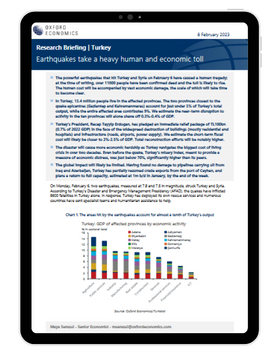Turkey earthquakes take a heavy human and economic toll

The powerful earthquakes that hit Turkey and Syria on February 6 have caused a human tragedy; at the time of writing, over 11000 people have been confirmed dead and the toll is likely to rise. The human cost will be accompanied by vast economic damage, the scale of which will take time to become clear.
What you will learn:
- In Turkey, 13.4 million people live in the affected provinces. The two provinces closest to the quake epicentres (Gaziantep and Kahramanmaras) account for just under 3% of Turkey’s total output, while the entire affected area contributes 9%. We estimate the near-term disruption to activity in the ten provinces will alone shave off 0.3%-0.4% of GDP.
- Turkey’s President, Recep Tayyip Erdogan, has pledged an immediate relief package of TL100bn (0.7% of 2022 GDP) in the face of the widespread destruction of buildings (mostly residential and hospitals) and infrastructure (roads, airports, power supply). We estimate the short-term fiscal cost will likely be closer to 2%-2.5% of GDP. Total reconstruction efforts will be notably higher.
- The disaster will cause more economic hardship as Turkey navigates the biggest cost of living crisis in over two decades. Even before the quake, Turkey’s misery index, meant to provide a measure of economic distress, was just below 70%, significantly higher than its peers.
Tags:
Related Services

Service
African and Middle Eastern Cities Forecasts
Comprehensive data and forecasts for major cities in Africa and the Middle East.
Find Out More
Service
MENA Forecasting Service
Monitor the implications of economic and market developments in the MENA region.
Find Out More
Service
Global Cities Service
Make decisions about market and investment strategies with historical data and forecasts for 900 of the world’s most important cities.
Find Out More